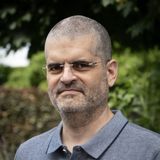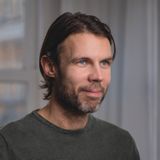Is humanity truly challenged or threatened by AI? Or could it be that AI is just holding us mirror, asking the question: what defines the human? According to the speakers tonight, it is time to separate fact from fiction in our narrative around AI. What if not intelligence, but consciousness – the fact that the ‘computation’ in our brains is accompanied by feelings of love, anger or joy- is what defines us?




About the programme
In an era marked by rapid advancements in artificial intelligence, the debate surrounding the capabilities and limitations of AI has never been more pertinent. At the heart of this discussion lies a fundamental question: Can AI truly replicate human consciousness? Enter Federico Faggin, the physicist renowned for his groundbreaking work as the inventor of the microprocessor. Unlike many in the tech field who envision a future where AI surpasses human intelligence, Faggin offers a compelling counter-narrative. He argues vigorously against the idea that human computers can achieve consciousness. According to Faggin, the processes occurring within the cells of our bodies are infinitely more complex than the most sophisticated AI systems. According to Faggin we have to look at quantum information theory if we want to truly understand consciousness: exactly like our inner life a pure quantum state is not knowable from the outside and therefore not cloneable. These quantum characteristics of consciousness are completely at odds with digital computing as we know it – even if we consider the most complex neural networks.
Neuroscientist Sarah Durston supports Faggin’s skepticism from a neurological perspective. She points out that despite AI’s growing capabilities, there remains a significant gap between neural activity and computational processes. Durston’s research into the brain’s intricate networks reveals layers of complexity that AI cannot yet replicate, underscoring the unique aspects of human perception and emotion.
Cognitive psychologist Jacob Jolij adds to this by exploring the psychological impacts of technology on perception and consciousness. Jolij’s studies suggest that human experience is shaped by factors beyond mere data processing, and that well-recorded phenomena in parapsychology can in no way be explained in a computational view on the human mind.
Philosopher Bernardo Kastrup, who has extensively explored the metaphysical aspects of consciousness and who has worked as an AI scientist at CERN and ASML, argues that we have confounded the map with the territory. While AI’s might more and more appear to be conscious does not in any way imply that they truly are: they are just an image, a map of consciousness, not consciousness itself.
According to these four experts science stands at a pivotal point: in the face of powerful AI’s it’s time to reconsider who we are as humans beyond the computational models we’ve built. This gathering promises to be a thought-provoking exploration of how quantum mechanics and cutting-edge science are reshaping our understanding of consciousness, challenging our assumptions about AI, and redefining the future of human cognition.
About the speakers
Federico Faggin, PhD, his theory argues that consciousness, unlike AI, is rooted in quantum mechanics, drawing parallels with theories from other leading physicists.
Sarah Durston, PhD, she integrates neuroscience with philosophical questions, focusing on the structure of the mind.
Jacob Jolij, PhD, examines how technology affects our perception and the reality we experience.
Bernardo Kastrup, PhD explores philosophical aspects of consciousness, advocating for non-materialistic perspectives.
Hans Busstra creates documentaries on technology and consciousness; now he explores latest insights on consciousness at Essentia Foundation.
Michael Dawkins explores the intersection of frontier science and age old wisdom, searching for new perspectives.






